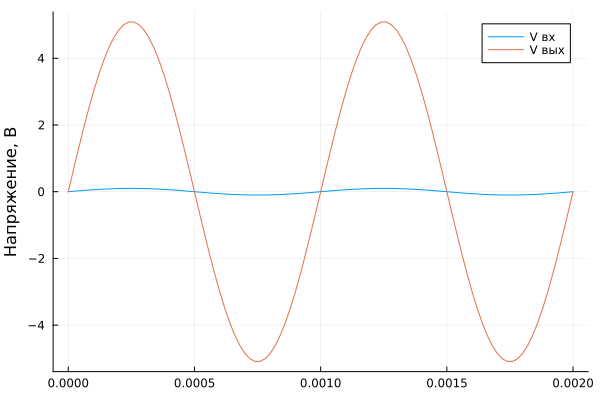An operational amplifier with a finite gain
Introduction
This example shows the operation of an operational amplifier with a finite gain.
Description of the model
The operational amplifier block in the basic physical modeling library Engee simulates an ideal case in which the gain is infinite, the input impedance is infinite, and the output impedance is zero. The finite gain operational amplifier unit in this example has an open-loop gain of 1e5, an input impedance of 100 kohms and an output impedance of 10 ohms.

As a result, the gain for this amplifier circuit is slightly lower than the gain that can be calculated analytically if we assume that the gain of the operational amplifier is infinite.
.png)
Simulation
Download and execute the assembled model.
Путь_примера = "$(@__DIR__)";
Имя_модели = "finite_gain_op_amp";
Путь_модели = joinpath(Путь_примера, Имя_модели*".engee")
if the model name is ∉ getfield.(engee.get_all_models(), :name)
engee.load(Model path);
end
model = engee.run(Model name);
Simulation results
We will get the required values from the simulation results.
t = модель["Vin"].time;
Vin = модель["Vin"].value;
Vout = модель["Vout"].value;
k_fin = модель["k_fin"].value;
k_fin = k_fin[length(k_fin)];
k_inf = модель["k_inf"].value;
k_inf = k_inf[length(k_inf)];
Let's plot the input and output voltages.:
using Plots
gr()
plot(t, [Vin, Vout]; ylabel = "Voltage, V", label = ["V vx" "V output"])
Let's estimate the values of the gain coefficients:
print("The gain factor of the ideal op amp: ", k_inf, "\n")
print("The gain factor of the ideal op amp: ", round(k_fin; digits = 2))
As can be seen, for an op-amp with a finite gain, its value turned out to be lower than the gain of an ideal op-amp.
Conclusion
In the considered example, an operational amplifier circuit with a finite gain is assembled and modeled.
